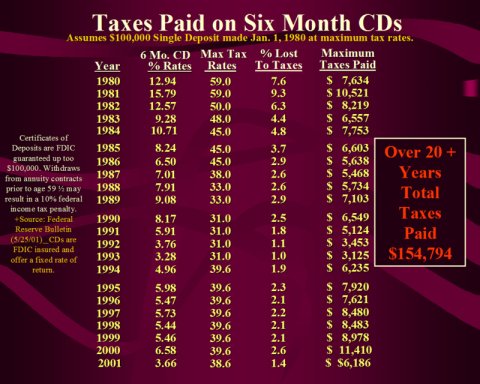An Alternative To CD’s A Tax-Deferred Annuity
What is a Fixed Tax-Deferred Annuity?
A Fixed Tax-deferred annuity, also referred to as a tax-deferred annuity, is
a contract between you and an insurance company for a guaranteed interest-bearing policy with guaranteed income options. The insurance company credits interest, and you don't pay taxes on the
earnings until you make a withdrawal or begin receiving an annuity income. Your annuity contract earns a competitive return that is very safe.
Tax-Deferred?
Tax-deferred means postponing your taxes on interest earnings until a future point in
time. In the meantime you earn interest on the money you're not paying in taxes. You can accumulate more money over a shorter period of time, which ultimately will provide you with a greater
income.
Tax Advantages
You pay NO taxes while your money is compounding. You can also pay a lower tax on
random withdrawals because you control the tax year in which the withdrawals are made, and only pay taxes on the interest withdrawn, Tax deferral gives you control over an important expense - your
taxes. Any time you control an expense, you can minimize it. The longer you can postpone this particular expense, the greater your gain when compared to the gain you would make with a fully taxable
account.
The Tax-Deferred Advantage
To illustrate the increased earnings capacity of tax-deferred interest,
compare it to a fully taxable earnings. $25,000 at 6.0% will earn $1,500 of interest in a year. A 28% tax bracket means that approximately $420 of those earnings will be lost in taxes, leaving only
$1,080 to compound the next year. If these same earnings were tax-deferred, the full $1,500 would be available to earn even more interest. The longer you can postpone taxes, the greater the
gain.
Tax-Deferred vs. Fully Taxable
Compare the Return
$107,297 Accumulated in a Tax-Deferred Annuity
$71,966 Accumulated in a Taxable Account
The Difference:$35,331
Note: That an
annuities guaranteed rate of 4%, the return after 25 years would be $66,646.
Safety
Your tax-deferred annuity is safe. A qualified legal reserve life insurance company
is required to meet its contractual obligations to you. These reserves must, at all times, be equal to the withdrawal value of your annuity policy. In addition to reserves, state law also requires
certain levels of capital and surplus to further increase policyholder protection. Legal reserve refers to the strict financial requirements that must be met by an insurance company to protect the
money paid in by all policyholders. These reserves must be at all times, equal to the withdrawal value (principal plus interest less early withdrawal fees, if any) of every annuity policy. State
insurance laws also require that a life insurance company must maintain certain minimum levels of capital and surplus, which provide additional policyholder protection.
No More 1099's
There is no withholding tax while your annuity is compounding; it is completely tax-deferred. If you request a
distribution (random withdrawals or annuity income), taxes will be withheld - unless you elect differently. Your election not to withhold can be made at the time you make your request. Because the
interest is tax-deferred, it is not necessary to issue a From 1099 while your money is compounding. Only when your interest is distributed (withdrawal or annuity income) will a Form 1099 be sent,
reflecting the amount of interest actually received.
When Does My Money Mature
An annuity policy does not "mature" like a bond or certificate of
deposit. Both your principal and interest will automatically continue to earn interest until withdrawn or you reach age 100. You can let your money continue to grow, make withdrawals, or begin
receiving an annuity income at any time.
What is the Penalty Tax and When Does it Apply?
An IRS penalty tax, currently 10%, may be payable on any withdrawal of interest or qualified premium made prior to age 59 1/2.
Avoid Probate
If a premature death should occur, the accumulating funds within your annuity may be transferred to your named beneficiaries, avoiding the expense, delay, frustration and publicity of the probate
process. Like most assets, the annuity is part of your taxable estate. Your heirs can chose to receive a lump sum payment, or a guaranteed monthly income.
Call for a free TAX FREE RETIREMENT review today!
Request a Quote
Steven G Kiel
P.O. Box 910
Wildwood FL 34785
Phone: 877-967-4766
E-mail: steve@yourmoneyprotectors.com
Or use our contact form.
Client Services
Discover the advantages of insuring with Steven G Kiel Sr Learn more.




